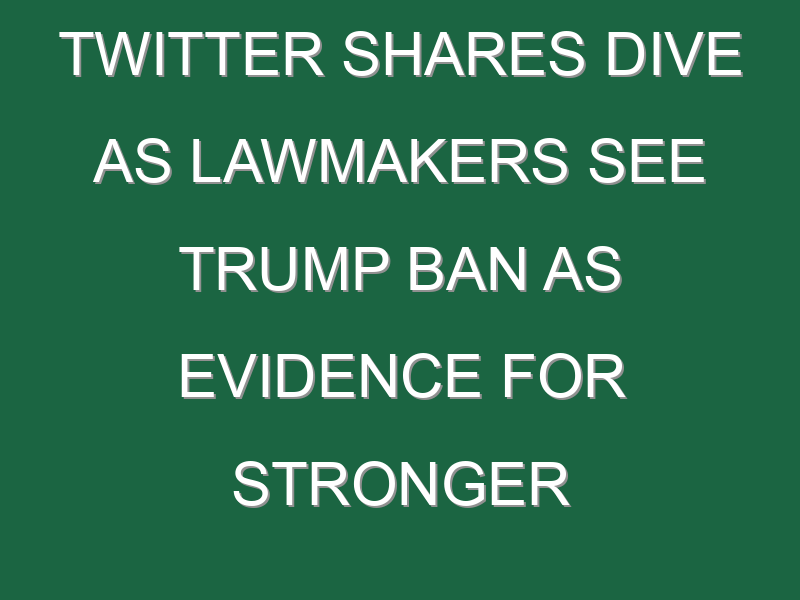Our mission to make business better is fueled by readers like you. To enjoy unlimited access to our journalism, subscribe today.
Twitter’s share price fell by as much as 8% in pre-market trading Monday morning, following the company’s Friday decision to permanently suspend U.S. President Donald Trump’s account.
Although the affected account (@realDonaldTrump) was the president’s personal account, it was the one he used primarily, and Twitter has never before banned a head of state.
The company’s decision, which came after the close of trading on Friday, made permanent the initially temporary suspension of Trump’s account over tweets that Twitter said were “likely to inspire others to replicate the violent acts that took place on January 6, 2021″—a reference to the Trumpist insurrection on Capitol Hill that left five dead.
Trump’s account had over 88 million followers, though many of his adherents had already been heading over to a relatively new, right-wing social network called Parler—that has itself now been taken out by app-distribution bans from Google and Apple, plus rejection by its hosting provider, Amazon.
Facebook, too, is down 1.8% in premarket trading, underperforming the tech-heavy Nasdaq.
Losing users may go part of the way to explaining why Twitter’s investors are souring on the firm, but the bigger reason is likely to be the regulatory fallout of last week’s events.
Twitter’s Trump block, as well as Facebook’s decision to suspend the President’s account at least until after President-elect Joe Biden’s inauguration next week, came too late for critics who have long seen the companies as being overly tolerant of hate and incitement on their platforms. Big Tech’s European nemeses were quick to leap on the shift as evidence of a need for change.
“No longer hide”
“Social media companies have blocked U.S. President Donald Trump’s accounts on the grounds that his messages threatened democracy and incited hatred and violence. In doing so, they have recognized their responsibility, duty and means to prevent the spread of illegal viral content,” wrote Thierry Breton, the European Union’s internal market commissioner, in a Sunday op-ed for Politico Europe.
“They can no longer hide their responsibility toward society by arguing that they merely provide hosting services.”
Breton said Twitter and Facebook’s moves proved they had become “systemic actors in our societies and democracies,” and not just neutral platform providers. He argued that the “dogma” underpinning Section 230 of the U.S. Communications Decency Act—which exempts platform providers from liability for the content posted on their services—”has collapsed.”
The commissioner went on to promote the European Commission’s “Digital Services Act” proposals, which would see Facebook and Twitter face enormous fines if they don’t stop the spread of illegal content on their platforms.
Cooperation pitch
It should be noted that Section 230 has a longstanding European counterpart in Article 14 of the EU’s E-Commerce Directive, which also exempts tech firms from liability for what’s happening on their platforms, unless they are made aware that the activity is illegal. Breton’s op-ed failed to note that the Digital Services Act will—the Commission has promised—leave those protections intact.
Nonetheless, Breton’s article concluded with a pitch to the incoming Biden administration, to collaborate on “globally coherent principles” about the regulation of online platforms. That invitation is likely to be warmly received, given that Biden has already said he’s in favor of repealing Section 230.
All of which may explain why investors are taking fright at Twitter’s Trump ban.
They may not have an ideological problem with the President’s semi-silencing, but they would have a big problem with Twitter and its peers losing the protections that they and their users take for granted—and the argument against those protections arguably strengthened last week.
More must-read tech coverage from Fortune:
- Who is Cristiano Amon, Qualcomm’s new CEO?
- Commentary: The Facebook antitrust suit is a major assault on entrepreneurs
- Vaccinating the world against COVID is off to a slow start. These firms think A.I. and blockchain could help
- Attempted coup at Capitol presents key opportunity for cyberattack, experts warn
- 5G will get better this year, promises Verizon exec




